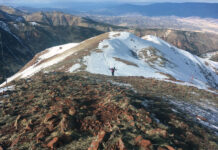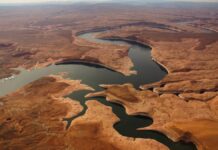State looking to oppose White River storage project in water court
For more than 4½ years, state engineers in Colorado have expressed concerns that a conservancy district has not proven there is a need for the water, which would be stored in the proposed White River reservoir and dam project.
Degrees of warming: Rising temperatures, shorter winters and a declining snowpack are impacting Aspen’s...
Pitkin County is warming, the number of frost-free days is increasing and snowpack is declining—all of which have myriad impacts on life in the Aspen area.
As 2020 kicks in, historic Colorado River Drought Plan will get its first test
This year, the first-ever Colorado River Drought Contingency Plan is set to launch, and water officials expect 2020 to bring unprecedented changes to the way the river is run, including cutbacks in water use by some states.
Aspen’s rich history of befouling the Roaring Fork River
As Aspen evolved from a bucolic high-mountain meadow to an industrial city, pollution began to flow directly into the Roaring Fork River and its tributaries.
States, Congress, Trump okay $156M to extend innovative Platte River recovery program
After a year of anxious waiting, scientists and researchers who’ve helped build one of the most successful species recovery programs in the nation have gotten a 13-year extension to finish their work.
Counterfeits hit home: consumers are being foiled by fake water filters
Refrigerator filters are an attractive target for counterfeiters, who may also be putting consumers at risk by selling filters that are not merely ineffective, but unsafe.
Video story: When in drought, call the beavers
Beaver reintroduction and restoration can help with some of the West's most profound water problems, both in terms of quantity and quality. A trial program is underway at Caribou Ranch in Boulder County.
As the Salton Sea shrinks, it leaves behind a toxic reminder of the cost...
Scientists fear that eventually the toxic residue of more than a century of agricultural runoff will be blown into the air — and into the lungs of residents.
Video story: Cooling the Yampa river (full length)
As climate change brings warmer weather, Westerners are looking for ways to protect the region’s rivers and streams. In a special report for the Water Desk, Jerd Smith of Fresh Water News explains a strategy for safeguarding Colorado’s Yampa River.
Small farmers wait for California’s groundwater hammer to fall
Farmers, large and small, are beginning to grapple with what the state’s first major groundwater regulation means for them.












